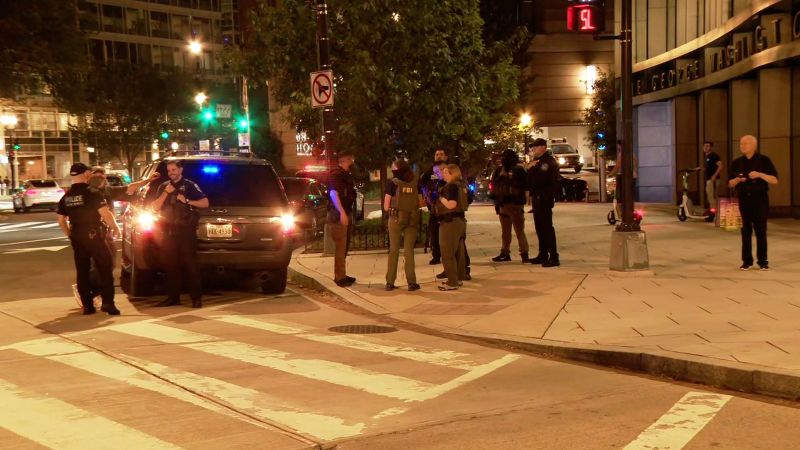On a recent Thursday night, small squads of federal agents moved through Washington, DC, engaged in the removal of homeless encampments, marking a controversial initiative tied to President Donald Trump’s enhanced law enforcement authority over the city. The operation primarily focused on Washington Circle, located in the southwest section of the city near George Washington University, where confusion quickly erupted among various agencies involved in the attempt to clear the area.
According to Jesse Rabinowitz, the campaign and communications director at the National Homelessness Law Center, the scene resembled a chaotic assembly, with personnel from the DC police, Secret Service, Customs and Border Protection, and the FBI all present. Despite the significant law enforcement presence, CNN reporters did not witness any tents being dismantled at the Washington Circle, suggesting disorganization among the federal agents involved.
This incident was further complicated by the fact that District of Columbia officials and advocates for the homeless had anticipated this federal operation. Notices were visibly posted on the tents within the encampment, informing homeless individuals that they were required to vacate by the following Monday. This timeline led to additional confusion, as many of the federal agents did not seem aware of the Monday extension, which had been planned by local authorities, particularly the DC Office of the Deputy Mayor for Health and Human Services.
As reports emerged about the ongoing situation, lawyers from the Washington Legal Clinic for the Homeless had to intervene on behalf of the encampment’s occupants, pointing out the notices to federal agents. Following extended discussions, the federal agents decided to withdraw from the scene. Rabinowitz expressed frustration over the incident, stating, “This is exactly what happens when a federal government takes over a city they know nothing about and do not care about.”
Throughout that week, advocates for the homeless had been preparing for the worst, urging city officials to increase the availability of shelter beds while also considering legal action in anticipation of these federal efforts. Individuals within the encampments, such as Meghann Abraham, voiced their resilience and expressed intentions to comply peacefully with government orders even amidst the uncertainty of their living conditions. Abraham emphasized, “We’re just people…working, trying to do well,” highlighting the everyday struggles faced by those living on the streets.
Earlier that Thursday, another significant operation had taken place at a nearby encampment by a highway adjacent to iconic sites such as the Lincoln Memorial and the Kennedy Center, where President Trump’s motorcade frequently passes. In the days preceding the encampment clearance, Trump had taken to social media to express his dissatisfaction with the visible presence of homelessness, reiterating an urgent call for the homeless population to vacate the capital “IMMEDIATELY,” while also assuring them that alternative accommodations would be provided away from the city.
Kierstin Quinsland, a spokesperson for Miriam’s Kitchen, acknowledged the impending clear-outs but criticized the federal government for not adequately communicating their plans to local outreach groups that work with the homeless. She characterized the scale of this undertaking as “unprecedented,” underscoring the potential disarray following such aggressive enforcement tactics.
Complications arose as some individuals in encampments had been linked to housing programs, and outreach representatives worried that such swift measures would sever their connections to support systems, ultimately jeopardizing their prospects of stable housing. Quinsland remarked that this operation addresses an issue stemming from the desire of those in power, including Trump, to avoid witnessing homelessness in neighborhoods or environments they frequent.
Overall, the recent actions taken by federal agents in Washington, DC, reflect a contentious intersection of policy, homelessness, and law enforcement, revealing the complexities of managing human welfare in the face of political agendas. The implications of such measures are likely to resonate throughout the community as advocates seek to provide support and understanding for those affected by these sudden governmental changes.











